Before gay rights activist Harvey Milk inspired an Academy Award-winning screen performance, it took the iconic upstart four attempts during his lifetime to successfully run and become the first openly gay man elected to public office in California in 1977. Three decades later, struggles for gay representation and civil rights still take time and patience to achieve, while the closer the movement inches toward victory, the more vocal its increasingly outnumbered opposition seems to grow.
This law of social progress informed efforts to obtain full civil marriage equality in 2008, a year associated predominantly with the high-profile, teetering fate of gay marriage in California, the most populous state. The jubilant Supreme Court decision legalizing marriage in May was followed less than six months later by the passage of Proposition 8, the marriage ban. Some 18,000 gay marriages have been left in limbo, while advocates and adversaries pursue legal and political responses.
Prop 8 may have delivered a startlingly bitter defeat in the wake of a spine-tingling presidential election, but even setbacks that deny marriage equality in the immediate term can help to educate potential allies, and lay the groundwork for eventual success in 2009, and beyond.
“We are once again within reach of ending marriage discrimination in several states this year,” says Evan Wolfson, founder and executive director of Freedom to Marry, a group working to win marriage equality nationwide. “Equally important, we have the post-Prop 8 opportunity to deepen conversation with non-gay people who see that something unfair happened in California, and now are more receptive to changing their attitudes,” he says.
Although the federal government currently offers no recognition of same-sex relationships, individual states continue to move forward, with the courts ruling on new possibilities in 2008, and legislation promising to advance equality in 2009. With so many developments at hand, it is helpful to identify where marriage and comparable rights are currently available, and to pinpoint the next likely fronts in the dizzyingly long campaign for equality. The road ahead may still be under construction, and the dialogue could grow even more deafening before it reaches a consensus, but as Milk observed, “Hope will never be silent.”
Federal Marriage Recognition: Ask Uncle Sam
Because of the Defense of Marriage Act, the federal government is prohibited from recognizing same-sex relationships as marriages, even if they are recognized as such in a state; DOMA also says that no state need recognize a same-sex marriage performed in another state. Congress passed DOMA in 1996, when pending court decisions and legislation on same-sex marriage in some states created fear that other states would have to recognize the marriages under the full faith and credit clause of the Constitution.
DOMA poses a significant challenge for couples in Massachusetts and Connecticut, the two states where full marriage equality is available now. The law denies married couples more than 1,000 rights associated with marriage on the federal level, including health insurance for spouses of federal employees, and tax deductions for couples jointly filing federal income tax returns.
These and many other inequities are why 15 gay and lesbian residents from Massachusetts filed an unprecedented lawsuit against DOMA in federal court in Boston on March 2. The plaintiffs, all members of same-sex couples legally wed in Massachusetts, charge that DOMA discriminates by denying them the rights allowed to heterosexual couples whose marriages are recognized by the federal government.
During his presidential campaign, President Barack Obama promised that he would repeal DOMA, but since his historic election as the first African-American president in November, his administration has not signaled it would make the repeal a priority early in its first term. Although the President does not support same-sex marriage, he has said that he supports federally recognized civil unions with all the rights and privileges of marriage. Consequently, some advocates are hopeful that civil unions could be instituted as an eventual compromise later in his first term. Others contend that only a union called “marriage” is acceptable, fair and just, whenever it finally happens.
Whatever the outcome, it is not likely to be resolved on the federal level in 2009.
Marriage Equality: Where to Go Now
Currently, same-sex couples seeking a civil, as distinct from a religious, marriage can find full, state-level recognition in Massachusetts and Connecticut. Both states began marrying same-sex couples after court rulings ordered equality for gays and lesbians. There is no residency requirement to marry in either state, but because of DOMA, most other states will not recognize a same-sex marriage performed in Massachusetts or Connecticut.
Marriages have been available to gay couples in Massachusetts since 2004, after the Supreme Judicial Court of Massachusetts ruled in Goodridge v. Department of Health in that it was unconstitutional to prohibit gay couples to marry. Since then, about 10,000 couples have been married in the state, the first in the nation to legalize gay marriage, and the legislature has successfully squashed attempts to amend the state constitution to prohibit same-sex marriage. It appears likely that marriage will remain legal in Massachusetts at least until 2012, the earliest it could be challenged again, barring another court decision on the state or federal level in the meantime.
In Connecticut, the Supreme Court ruled in Kerrigan and Mock v. Department of Public Health in October 2008 that the ban on gay marriage infringed on a fundamental right of same-sex couples. Gay marriages began in Connecticut in November.
Building on this momentum, in November Gay and Lesbian Advocates and Defenders announced the goal, “Six By Twelve.” The group aims to ensure that same-sex couples in all six New England states will be able to marry in their home state by 2012.
“We can make New England a marriage equality zone by strategically combining existing legal, electoral, and on-the-ground know-how to fast-track marriage in every New England state,” GLAD Executive Director Lee Swislow said in a statement. “By 2012, we not only can have marriage equality throughout New England, we can have a road map for the rest of the country.”
In nearby New York, unlike most other states, gay marriages from Massachusetts and Connecticut are recognized, as well as marriages from all other countries where they are legal, including Belgium, Canada, Netherlands, Norway, South Africa, and Spain. Governor David Paterson issued a directive in May 2008, which provides that couples married elsewhere who become New Yorkers are entitled to the same benefits as straight married couples in the state.
However, gay couples cannot get married in New York. A bill to legalize same-sex marriage passed the lower chamber of the state legislature in June 2007, but it has yet to pass the Senate. Advocates commonly suggest the Democratic Senate leadership will act when votes for the legislation are assured, which increasingly looks more likely to happen no earlier than 2010, given the need to address the state’s severe economic woes.
Civil Unions: Roses by Some Other Name
Also in the Northeast, civil unions are available to gay couples in New Hampshire, New Jersey and Vermont. Civil unions theoretically give same-sex couples all the same state-level benefits of marriages. However, in the real world of employee benefit plans and related concerns, civil unions sometimes are not recognized to be on par with marriages. In fact, the New Jersey Civil Union Review Commission released a 79-page report in December 2008 that details the failings of the state’s civil union law, enacted in 2006 in response to a court ruling that called for equality but did not specify marriage.
Because of these shortcomings, and in an effort to avoid a separate but equal classification, gay advocates and allies in states where civil unions are available continue to push for marriage.
In New Jersey, which regards same-sex marriages from other states as civil unions, Democratic Governor Jon Corzine has pledged his support for gay marriage legislation.
“New Jersey is going to reverse that trend and we’re going to move forward,” he told the audience at the Human Rights Campaign’s New York Gala in February 2009, speaking about the disappointment of Prop 8 in California months earlier. “You’re going to have a happy governor signing the marriage equality bill when it gets to my desk,” he said.
It is generally expected that the New Jersey legislature will move on the marriage bill later in 2009, after the November elections.
New Hampshire and Vermont are also considering marriage bills in their state legislatures in 2009. The former enacted civil unions through legislation in June 2007, and the latter became the first state in the union to offer civil unions comparable to marriage in 2000.
One advantage of securing same-sex marriage legislatively is that it confers a popular legitimacy that sometimes escapes court rulings, particularly fresh off the era of complaints about unaccountable “activist judges.” Passing legislation also indicates that marriage advocates are winning in the most important court of all, that of public opinion.
“When we win in the legislature, it tends to reflect that you’re even further along in changing public opinion, but courts play an enormous role as well,” says Wolfson.
Thus far, no state legislature has passed and enacted a same-sex marriage bill. California most recently came close in 2007, but Governor Arnold Schwarzenegger vetoed the legislation for a second time. In 2009, however, legislatures in various regions of the country appear determined to try.
Next Frontiers: New State Action and Prop 8 Revisited
Efforts to advance marriage equality are also underway this year in state legislatures in Maine and Rhode Island, in keeping with GLAD’s “Six by Twelve” initiative. Minnesota has a marriage bill under consideration, and advocates in Maryland have vowed to reintroduce legislation to legalize same-sex marriage.
Meanwhile, in Hawaii, the state legislature is considering a civil union bill that would give gay couples the same rights and benefits provided to married couples. The legislation passed the Hawaii House in February, and was awaiting approval in the Senate.
In one instance of courtroom activity, oral arguments were held in December before the Iowa Supreme Court in the case, Varnum v. Brien. Attorneys from Lambda Legal representing six same-sex couples seeking to marry in Iowa argued that the state’s law defining marriage as only between a man and a woman violates equal treatment and due process as guaranteed under the state constitution.
On March 5 in San Francisco, the Supreme Court of California heard oral arguments regarding Prop 8. In what some are calling the most significant civil rights case in recent times, the Court considered the validity of Prop 8, as well as the validity of the 18,000 same-sex marriages that were legally performed after the Court legalized same-sex marriage with its high-profile ruling its May.
During the three hours of oral arguments, attorneys seeking to overturn Prop 8 argued it was an instance of the majority taking a right from a minority protected class, a sweeping violation of the equal protection clause that drastically changed the state constitution. Therefore, Prop 8 is actually a revision, rather than simply an amendment, to the state constitution. Unlike an amendment, a revision requires the higher threshold of a constitutional convention or approval by a two-thirds vote of the legislature, neither of which occurred for Prop 8, so the initiative should be invalidated.
The argument did not appear to persuade the seven justices, who seemed more apt to support the will of the people as expressed through the ballot initiative process, a right that was vociferously defended by a lawyer for Prop 8, Kenneth Starr. Best known as the former U.S. Solicitor General who investigated the affair between President Bill Clinton and White House intern Monica Lewinsky, Starr also argued that the 18,000 same-sex marriages performed before Prop 8 passed should be invalidated. However, the justices appeared to lean toward upholding the marriages, which occurred after their initial ruling that same-sex marriage was legal, after all.
The court’s decision in the case must come within 90 days of the March 5 hearing, which was held in San Francisco and broadcast live on the California Channel. In addition to hearing challenges to Proposition 8, the court is considering the fate of 18,000 same-sex marriages that occurred before the November election.

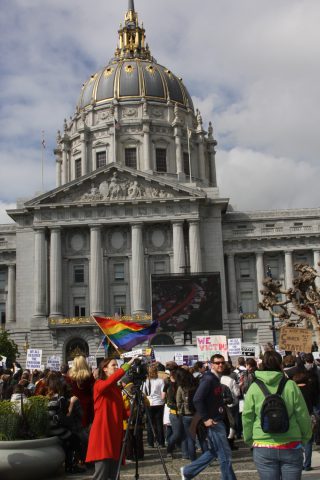
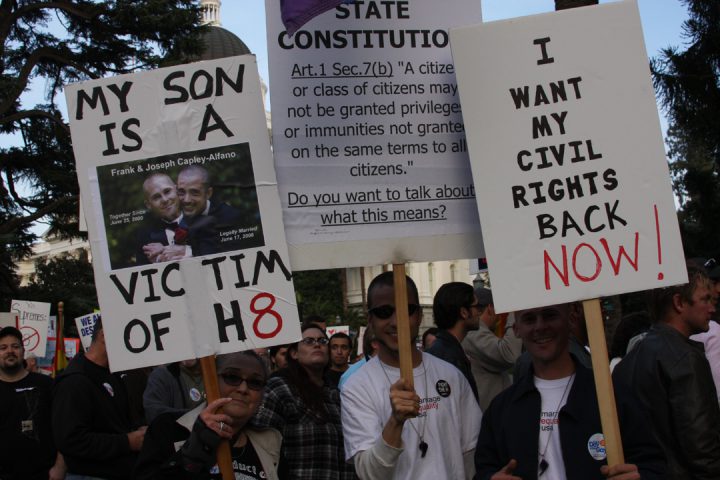
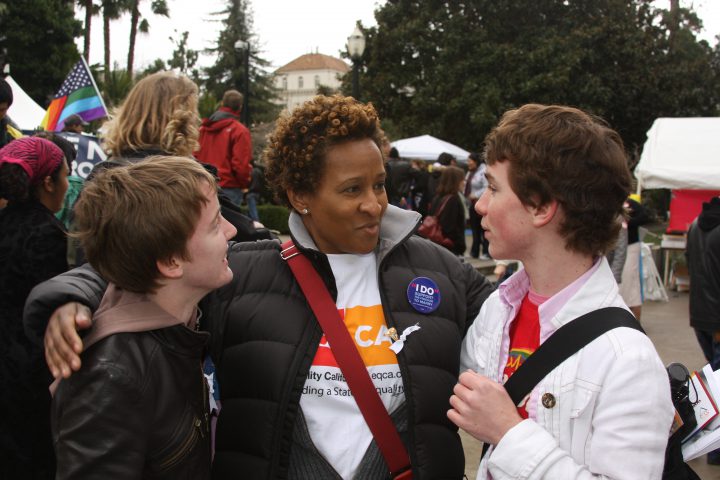
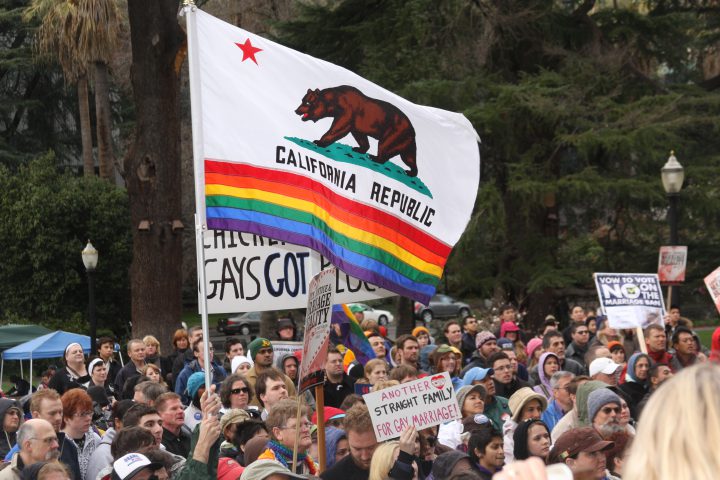
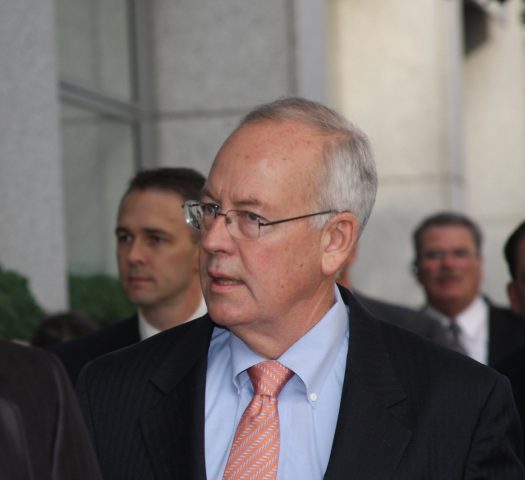
What Do You Think?